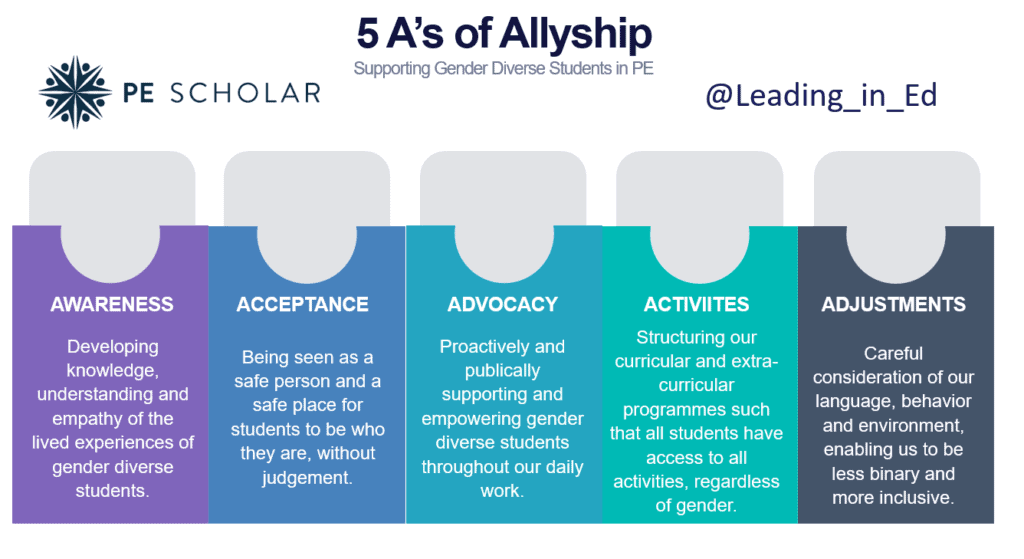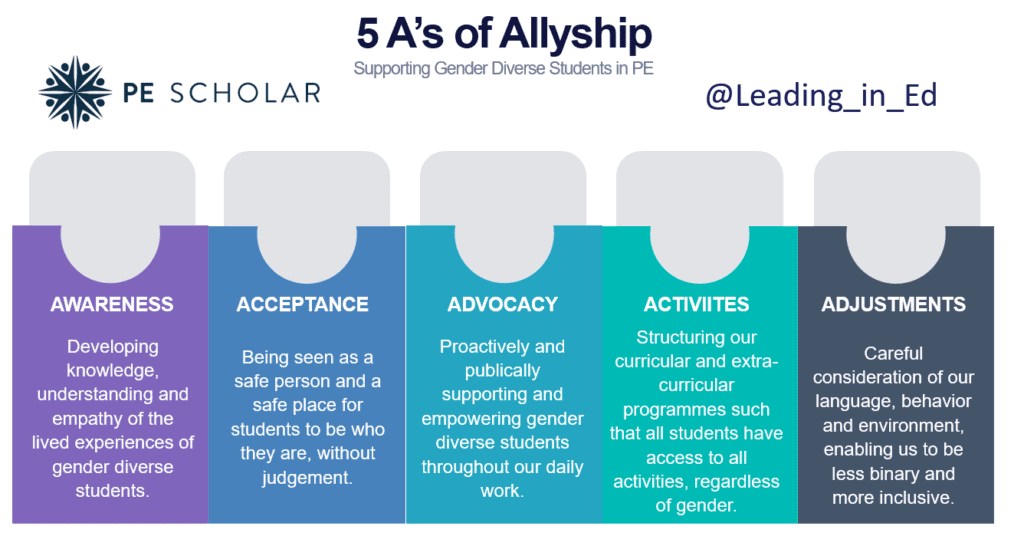
Are you creating a safe and supportive space for ALL students?
Is PE part of the problem or part of the solution?
Embracing Gender Diversity
In March of 2022, we asked if PE is a safe place for all children to be active?
In this previous Insight Blog post, we offered our thoughts on how PE can be a safer and more inclusive space for all children. Specifically, we looked at the challenges that transgender and gender diverse pupils face in PE, which for many, remains a heavily gendered subject area. PE can have ingrained traditions and routines that perpetuate certain gender stereotypes such as boys playing rugby or only certain athletic or tall girls being selected for the netball team. It goes without saying that these examples amongst many others can be harmful to not only children that are questioning their gender identity and/or gender expression, but for all children.
In this blog post, we will delve deeper into why it is incumbent on the PE profession to take proactive steps to be LGBTQ+ allies; being positive role models that challenge gender stereotypes that perpetuate harmful messages, making all children in our care feel more safe.
Growing up LGBTQ+
The Just like Us – Growing up LGBT+ report (2022) highlights the challenges that are faced by children that identify as LGBT+. Among the disturbing reading around poor mental health, were some green shoots of hope. Positive messaging in schools about LGBT+ was linked to improved pupil mental health and reduced suicidal thoughts and feelings, regardless of whether they identify as LGBT+ or not.
“74% of LGBT+ pupils who have never had positive messaging from their school about being LGBT+ have contemplated suicide but this drops to 65% when their school provides strong positive messaging about being LGBT+.”
Just like Us – Growing up LGBT+ report (2022)
In light of these startling statistics, it is time for us to ask ourselves: are we doing enough to support students that identify as LGBTQ+ in our school?
Keeping Children Safe
Keeping Children Safe in Education provides statutory guidance from the Department for Education, for which all staff working in schools have a legal obligation to adhere to, states very clearly:
Safeguarding and promoting the welfare of children is defined for the purposes of this guidance as:
Keeping Children Safe in Education (2022, p6)
- protecting children from maltreatment
- preventing the impairment of children’s mental and physical health or development
- ensuring that children grow up in circumstances consistent with the provision of safe and effective care, and
- taking action to enable all children to have the best outcomes.
It goes on to outline the role of school and college staff, stating that “all staff have responsibility to provide a safe environment in which children can learn”. Due to the unique nature of our subject, PE teachers play a fundamental role in safeguarding children against harm. Combine this with the wider influence of sport in society, where discrimination and prejudice remains rife, we must do our part to call out discrimination in all forms; enabling PE to be a truly safe place for all children to learn and thrive.
Social Justice
Lynch, Walton-Fisette and Luguetti (2022, P.3) describe social justice as “being able to live in an equitable liberatory society where people have justice, and people are critically conscious to sociocultural issues and act against them”. Therefore, this goes far beyond just providing equal access but actively supporting, addressing, and recognising the needs, motivations, barriers and stereotypes associated with different groups and seek opportunities to challenge our own and others’ unconscious biases.
It is our view that PE has a key role to play in tackling inequalities and prejudices toward the LGBT+ community. The data from the Just Like Us report and the fundamental principles of safeguarding and promoting well-being, supports our view that a fairer and more socially just PE provision can support all pupils, regardless of their background and experience.
How to be an LGBTQ+ ally
This excellent Michelle Visage’s Rule Breakers podcast eposide reveals how Sam Smith navigated growing up as LGBT+ and the impact that a lack of allies had on their life (although they have an amazingly supportive family). The feeling of isolation and the fear of facing prejudice and discrimination takes a huge toll on a child who identifies as LGBTQ+; and this is hard to comprehend for someone that does not have those lived experiences.
Our 5 A’s of allyship outlines how we, as PE practitioners, can publicly show our support for this particularly vulnerable group and why this is so important.

Ask yourself…
It is time to take a step back, away from the often heavily bias and toxic narrative being shared in the media and on social media about the transgender debate, and ask ourselves some simple questions, that might prove difficult when answered honestly:
- Do all students feel safe and valued in your PE Department?
- Specifically, do students that identify as LGBT+ or are questioning feel safe in your school and in your PE Department?
- How do you know?
- Are you aware of how staff behaviours may be having a damaging effect on pupils that are questioning their gender identity?
- Are staff aware of unconscious biases they might have that could be perpetuating potentially damaging gender stereotypes?
- Is there a culture among staff where it is safe to challenge the behaviours and attitudes of colleagues?
- Are you and your colleagues prepared to challenge the status quo and take an alternative approach, in order to make PE a more inclusive space?
Lynch, Walton-Fisette and Luguetti (2022, P.2) go on to describe the hidden curriculum as the “untold or unimplied consequences of our teaching/coaching”. Are you aware of the potential negative impact that aspects of your PE provision has on LGBT+ pupils? What informs your decision making on curriculum and its delivery beyond tradition and routine? Do you actively challenge prejudice and gender stereotypes within your staff and the students?
Want to learn more about supporting gender diverse students?
We have launched a new course – Embracing Gender Diversity, The first in our Belonging in PE series. This course starts with an informative section that aims to support PE practitioners to better understand the issues surrounding the trans (and wider LGBTQ+) community. Following a discussion of various research that validates the need to support this vulnerable group, the course is split into five sections that challenge participants to reflect on various aspects of PE provision through the lens of a young person with gender dysphoria and provide a range of practical and sometimes simple measures to support transgender and gender diverse students to feel genuinely safe and valued in PE.For more information about the course and how to register your interest, sign up here.


Responses